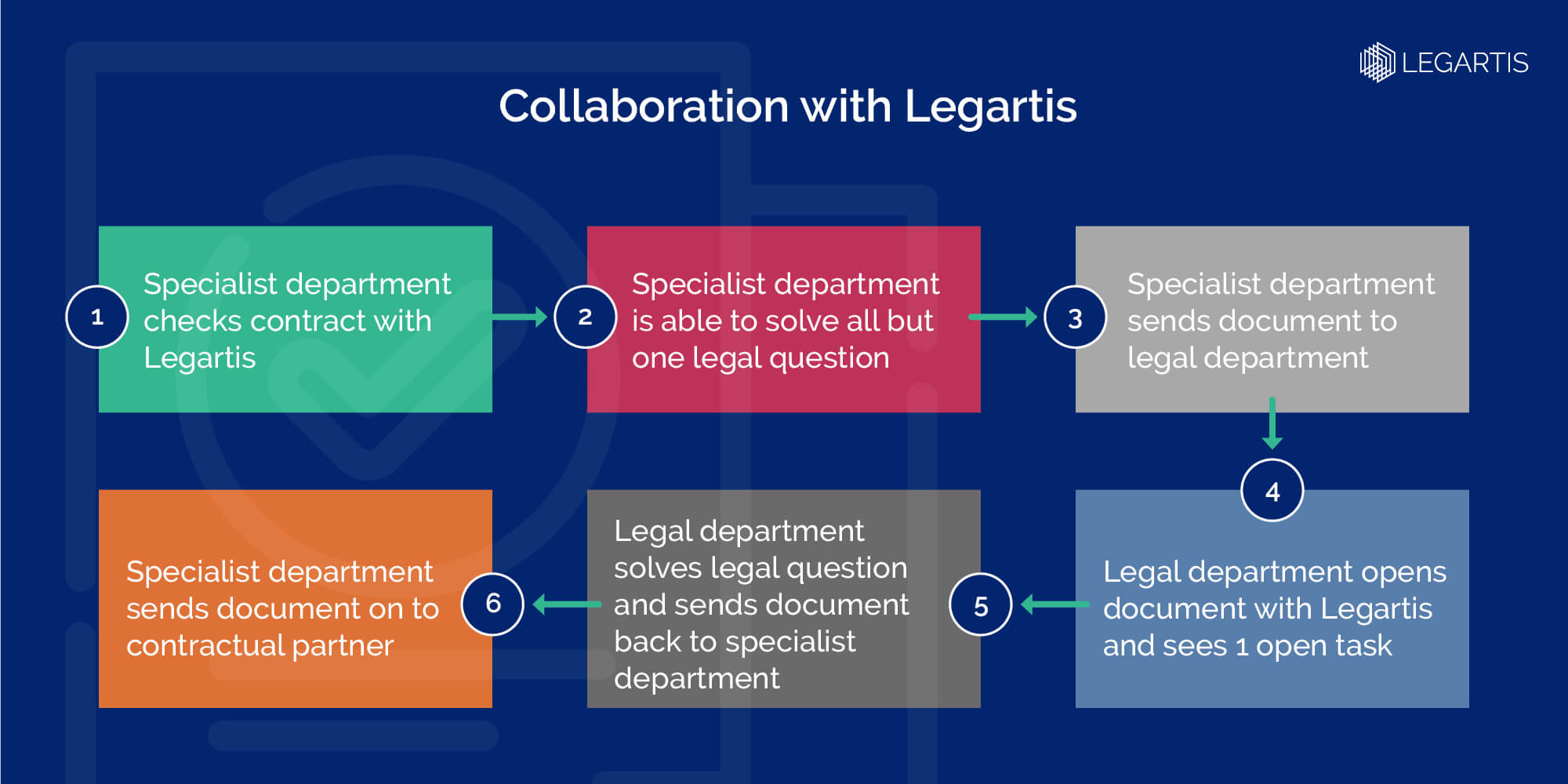Are you considering supporting your legal team with artificial intelligence? Then you probably feel like many of our clients: you have unanswered questions about the automated contract review with Legartis. We’ve answered the most common ones for you here in a nutshell.
Automated contract review with Legartis AILegartis is a legal tech solution that supports legal departments as well as sales and purchasing organisations in contract review.
Legartis AI at a glance
- Legartis ensures that your company's internal compliance guidelines are adhered to – regardless of how legally experienced the users are. This preserves the valuable resources of your company's top lawyers.
- The Legartis AI analyses incoming contracts and delivers exact results in seconds. This way it provides your legal team with effective added value.
- The Legartis AI comes pre-trained. You can therefore use it without a long lead time.
How does the Legartis AI know which clauses are permissible for my company?
The Legartis AI works on the basis of a contract playbook that you create at the beginning of our collaboration. In this contract playbook, you define your individual company guidelines and standard formulations. This playbook tells the AI how to deal with your results – for example, which clause must not occur or be checked separately.
Good to know: if the internal legal rules of a company are clearly defined, it only takes a few hours to create the contract playbook.
Does the Legartis AI only recognise clauses that I enter into the Contract Playbook myself?
The Legartis AI comes with a predefined database of clauses for different types of contracts. These clauses are already listed in the contract playbook and are available to you right from the start.
Good to know: Legartis created this predefined database in cooperation with customers from a broad range of sectors. Therefore, it contains a diverse, practical range of clauses.
If, for example, "contractual penalty" has been defined in the Contract Playbook, does the AI also recognise any synonyms?
The Legartis AI doesn’t just contain a pure word search. It’s trained on the basis of many sentence examples to understand words in the context of the sentence. Therefore, as a rule, it also recognises variations without errors.
Good to know: Legartis AI establishes semantic connections and finds topics in contracts regardless of whether the searched-for word explicitly occurs in them.
What about complex contracts where the other contracting party includes clauses that aren’t standard? Does the Legartis AI recognise this?
The pre-trained clauses are broad enough for the AI to keep track of complex contracts and reliably detect clauses. The Legartis AI has no problems finding a contractual penalty, for example if it has been inserted in an unusual place in the document.
Good to know: the Legartis AI also recognises clauses that do not comply with the standard.
Do I have to check the contract manually after analysis with the Legartis AI?
We always recommend our clients to check their documents again before sending it to their contractual partner. The Legartis AI supports you in an intelligent way and saves you time during the review, but it does not completely replace the work of competent lawyers.
Good to know: the Legartis AI works reliably. Nevertheless, after the analysis, human employees should approve the contract.
Does the Legartis AI also understand other legal systems, such as UK or American law?
We make sure that the Legartis AI recognises legal concepts in contracts from different legal systems. In the German language area, the AI can handle Swiss, German and Austrian documents. Our English language AI has been trained for documents from both common law and civil law countries.
Good to know: our AI is trained for documents from different legal systems.
How does the Legartis AI ensure that it works according to current legal requirements?
The Legartis AI doesn’t automatically check whether a contract complies with legal or regulatory requirements. This is the responsibility of the legal department – to keep the contract playbook rules up to date with the latest legal and regulatory requirements.
Good to know: the Legartis AI does not perform automatic updates in accordance with law changes.
Is the AI able to check bilingual contracts?
In practice, bilingual contracts hardly ever occur. As a rule, users review only one language at a time and then make the corresponding changes in both languages. This type of workflow is supported by the Legartis AI.
Good to know: the Legartis AI speaks German and English. Other languages can easily be trained.
How does implementation into other systems work?
The Legartis AI works in Microsoft Word. Therefore, it can be combined with any application that allows document verification in Word.
Good to know: in the near future we will also be developing integration possibilities with other systems via an API connection.
Is Legartis only used in specialist departments or also in the legal department?
Legartis supports different teams in working closely and productively together. Companies can therefore use Legartis profitably in all departments.
Good to know: Legartis is often used to enable specialist departments to independently review standardised contract types such as NDAs and DPAs. Various legal departments also report that they save valuable time when reviewing NDAs and DPAs with Legartis.
Your question wasn’t answered?
No problem, we have more answers in store! Our AI experts are happy to advise you personally and accompany you on your next step towards automated contract review with artificial intelligence. Write to us!
Recommended Articles
Agentic Legal AI: When AI Shifts from Assistant to Actor
The days when AI in the legal industry was little more than a glorified spell checker are over. What sounded like science fiction just a few years ago is now reality: Agentic..
Agentic AI: Automated Generated Contract Playbooks
Every day, countless agreements are drafted, negotiated, and signed. For legal departments, legal-ops teams, and procurement leads, it is essential to keep track: Which..
Trends 2025: AI in Contract Analysis
The latest trends in Large Language Models (LLMs) show a shift towards greater efficiency, advanced AI agents and wider adoption across all industries. AI models are becoming..




